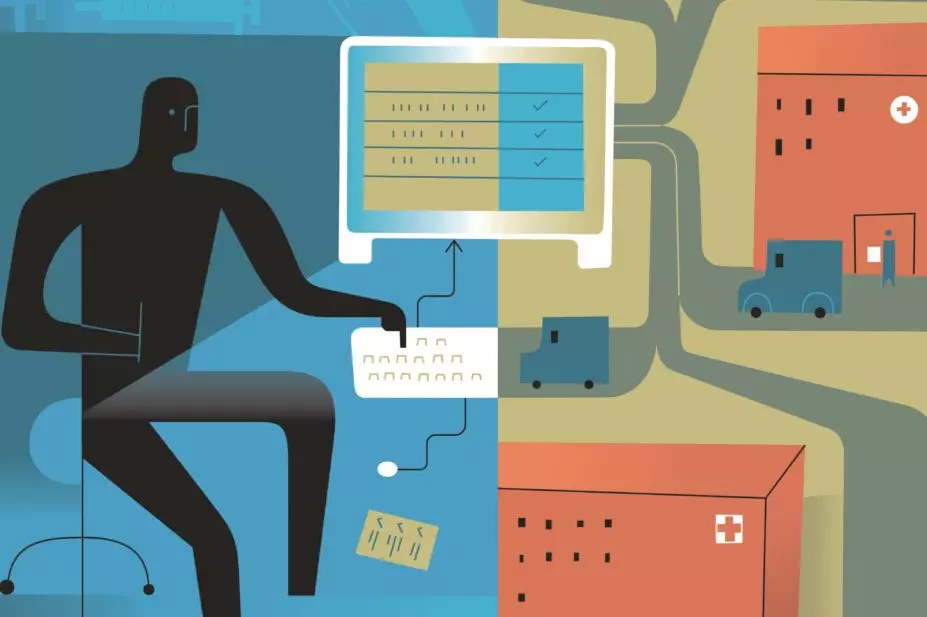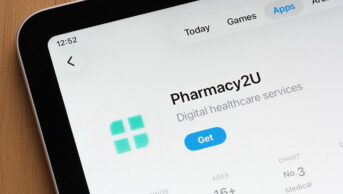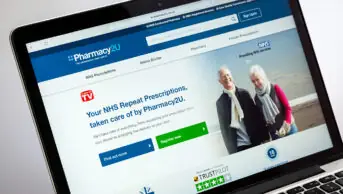
ImageZoo / Alamy
Fancy owning your own pharmacy? You could buy an existing one. You will need to pay several times its net profit for the business’ goodwill but, after a decade of hard slog to pay off the bank loan, the business and all its profits will be yours.
If this initial outlay is off-putting, you could set one up from scratch. However, anyone wanting to open a pharmacy that dispenses NHS prescriptions must apply to their NHS England local area team to be included on the local pharmaceutical list. For a traditional bricks-and-mortar pharmacy, you will need to justify the need for it.
For an internet pharmacy, however, you do not. So is this a business opportunity worth considering, and what do applicants need to consider when setting one up?
A misnomer
The correct term for an ‘internet pharmacy’ is, in fact, a ‘distance-selling’ pharmacy, explains Conor Daly, a pharmacist and barrister, and a partner at consulting firm Rushport Advisory. The company consults to a wide range of pharmacy contractors about how to secure permission to open internet pharmacies, and writes standard operating procedures for them. “The term ‘distance-selling’ comes from the fact that there can be no face-to-face contact between patients and the pharmacy staff for the delivery of essential services,” he explains. “Contrary to popular opinion, patients are allowed to access the pharmacy but only for non-essential services — for example, medicines use reviews (MURs).”
Such a set up could give rise to ethical dilemmas. “If a patient were to present a prescription at the same time as receiving an MUR, the pharmacy staff are obliged to refuse it as it would be contrary to their terms of service,” says Daly. “Such refusal to dispense will feel very odd for a professional pharmacist.”
Building a business plan
“Internet pharmacies must be willing to supply medicines against a prescription to anyone in England,” Daly points out. “However, in reality, most will target their local area for business.” He explains that if a person arrives at the pharmacy with a prescription they must be turned away, but if the pharmacy is located in Newcastle and someone in Cornwall posts them a prescription then the pharmacy cannot refuse it and must deliver it to the patient free of charge (see: ‘Registering a distance-selling pharmacy’).
Registering a distance-selling pharmacy
Whether you intend to set up a bricks-and-mortar pharmacy or a distance-selling pharmacy, you will need to register in the same way with the General Pharmaceutical Council (GPhC). The cost for registering a pharmacy with the GPhC, along with the necessary forms and fees, can be found on its website. A new application for registration currently costs £568, plus a first entry fee of £221. There is also a £50 application fee (and conditions of use) when applying to use the GPhC’s voluntary internet pharmacy logo.
However, the process for securing a new NHS dispensing contract is different for the two types of pharmacies. Bricks-and-mortar pharmacies must prove there is local need for a new pharmacy — typically by referring to the local pharmaceutical needs assessment. They are able to provide patients, both face-to-face and online, with essential services (such as dispensing) and advanced and enhanced services. Internet pharmacies only need to prove that they will comply with the distance-selling rules to secure an NHS contract. They can also provide patients with enhanced and advanced services on the premises, but cannot provide essential services on, or in the vicinity of, the premises.
“There are internet pharmacies that regularly dispense over 10,000 items per month,” Daly adds. “The largest dispenses over 50,000 items per month, so it is possible to dispense high volumes of items if the business proposition is right. But there is no point in just setting up a pharmacy and website and thinking the prescriptions will start flooding in automatically — they won’t.”
As soon as your internet pharmacy is up and running, you need to have a method for getting prescription medicines to patients. Ian Ashby, pharmacy superintendent for PCPDirect.co.uk, says that around 95% of his prescriptions are delivered to local patients by delivery drivers employed by his business. The rest need to be sent by courier or registered post. This could mean that a pharmacy owner would need to spend around £7 to send 28 aspirin tablets by Royal Mail, he suggests as an example.
According to the General Pharmaceutical Council (GPhC), there are currently 496 websites attached to 453 pharmacy premises registered in the UK, so there is already a lot of choice available to customers. Your chances of business success could be enhanced if you offer something that others do not.
“Aim to find yourself a niche product as this will make your business stand out from the crowd,” Ashby recommends. When his internet business started, his business partner identified a natural soap made using spring water from Yorkshire. They secured exclusivity with the product’s manufacturer and the agreement has been a win-win for both businesses — boosting sales of the soap while drawing more internet traffic to Ashby’s website.
“You will also need to decide the best way to advertise your services — this may be through leaflet dropping or advertising in the local press. Therefore, think carefully about whether there is a market in your area,” Ashby adds.
Care homes are one audience that could be targeted by a distance-selling pharmacy as a method for getting prescription figures up quickly. This is a tactic that Ashby has used but, with hindsight, he warns: “They recognise their value and tend to demand something in return for switching to use your service. We are also often faced with late evening requests for urgent antibiotics. Are you prepared to offer exceptional service levels?”
Internet versus bricks-and-mortar pharmacies
There are undoubtedly pros and cons for owning an internet pharmacy. “On the plus side, it offers pharmacists an opportunity to open their own pharmacy without having to buy an existing business or argue the need for a new NHS dispensing contract,” Ashby points out. “It also offers the opportunity for pharmacies to be built in areas where community pharmacies aren’t traditionally located — such as industrial estates.”
“The biggest disadvantage is the lack of patient contact. It doesn’t matter how many questions you ask someone by phone or by email — you will still miss the mannerisms and facial expressions of a face-to-face discussion.
“You will also need to make the case for patients to use you rather than walk into their local pharmacy. That said, with several internet pharmacies [having] become well established, there is clearly a market for them.”
Selling overseas
Although internet pharmacies are not contractually obligated to dispense prescriptions from other countries, the worldwide web does provide an opportunity to tap into markets on other shores. However, Ashby warns, you need to be aware of the import restrictions that exist in other countries. This information is usually available from government websites for the countries in question.
Value of online pharmacies
Although rare, online pharmacy businesses do occasionally become available for purchase, allowing the buyer to inherit its existing customer base. Ashby believes there are pros and cons to buying an existing internet pharmacy and highlights that, once purchased, one could be moved to any other part of the UK. “You would need to decide whether the head start you get from adopting an existing business is worth the additional investment,” he surmises.
Setting up the pharmacy
Before you can apply to be on the NHS pharmaceutical list, you need to identify suitable premises. Daly says that any type of premises can be used to operate an internet pharmacy — be they residential, retail, office or warehouse. There are two provisos:
a. Will the council allow a distance-selling pharmacy to operate from the premises?
b. Will the GPhC approve the premises?
“It is worthwhile talking to the local council early to get their view on the suitability of the premises,” Daly suggests. “Anyone looking for premises will need to ask the landlord what type of planning permission the proposed premises has and check with the local council to ensure that it allows you to operate a distance-selling pharmacy.
“You may need to submit a planning application or request formal confirmation from the local council that the premises may be used in the way that you want to. The landlord is also likely to want to know what type of business will be operating from their premises.”
NHS dispensing contract
Successfully applying for an NHS dispensing contract will be an essential component of the business model for most distance-selling pharmacies. “Many internet pharmacy applications are refused because applicants don’t provide all necessary information with their application or, worse still, provide information that shows they will not operate in accordance with the regulations without even realising it,” Daly warns. The main difficulty applicants face, he says, is Regulation 25(2)(b) — it states that the NHS must refuse the application unless it is satisfied that the pharmacy’s procedures are likely to secure: the uninterrupted provision of essential services during the opening hours of the premises to persons anywhere in England who request them; and the safe and effective provision of those services without face-to-face contact between any person receiving those services (whether for themselves or on someone else’s behalf) and the pharmacy staff.
“Applicants often ask whether the mention of ‘pharmacy procedures’ means the local area team will want to see standard operating procedures,” Daly adds. “They may do. Each area team in England seems to interpret the regulations differently. Even within the teams, individual members of staff can interpret things differently. We have seen examples of two identical applications submitted to two different area teams where one was approved and the other refused. However, since it costs £750 to submit an application, it’s worthwhile getting it right first time.”
GPhC licence
“Once the application is approved, the pharmacy normally has six months to open — although it is possible to extend that period by three months,” Daly explains. “GPhC approval is the next hurdle. A pharmacy cannot open unless it is approved by the GPhC. While the GPhC publishes guidelines on premises standards, these are also open to interpretation and different GPhC inspectors can take slightly different approaches. It is therefore worth involving the GPhC as early as possible.”
A GPhC spokesman told The Pharmaceutical Journal that premises can only be registered as a pharmacy if the owner’s service model from those premises includes one of the following:
1. The sale of Pharmacy (P) medicines;
2. The supply of P medicines or Prescription-only medicines (POMs) against prescriptions;
3. The supply of P medicines or POMs against prescriptions written by veterinary practitioners for the treatment of animals under the ‘cascade’.
The spokesman added: “All services provided from registered pharmacies and by pharmacy professionals must comply with our standards. Our standards, and the legal requirements that apply to supplies made in a high street community pharmacy, apply equally when a supply is made over the internet. [Pharmacy professionals] must also make sure that they do their best to provide medicines and other professional services safely … and be satisfied that patients know how to use their medicines.”
Consultation on draft GPhC guidance for internet and distance-selling pharmacies ended in December 2014. Feedback from that consultation is being reviewed and the amended guidance will be published in the coming months.
No shortcuts
For those who think an internet pharmacy might be a shortcut to a bricks-and-mortar pharmacy, Daly highlights the following circumstance:
“A pharmacy company in north west England thought there was a loophole in the regulations and decided to open internet pharmacies with a twist. They would have two separate premises within the same building that were connected by a hatch in an internal wall through which information, documents and medicines could be transferred. One premises was used to collect the prescriptions. These were then sent to the second premises for dispensing and then back again to the first premises for collection by patients. The company involved set up several such pharmacies until primary care trusts challenged their legality. Each one ended up being shut down and the company went into administration.
“I still receive enquiries from pharmacists who think they are the first to spot this loophole even though people have tried to exploit it since 2005,” he says.
“The 2013 Regulations say that the pharmacy must not offer to provide essential services to persons who are ‘present at’ — which includes ‘in the vicinity of’ — the listed chemist premises. I suspect there will be further challenges to this wording as the word ‘vicinity’ is considered by the courts to mean the same as ‘neighbourhood‘ — so it could cover a very wide area.”
Internet pharmacy in the United States
In the United States, since patients pay for most prescriptions, they are free to choose where they get their medicines dispensed (i.e. pharmacies do not need to be put on an equivalent to the NHS pharmaceutical list). A spokesman for the National Association for Boards of Pharmacy told The Pharmaceutical
Journal that legitimate internet pharmacies in the United States must be registered with the pharmacy board for the state in which they are located, and with the pharmacy boards for any state “into which they practise pharmacy”.
However, he added: “If a rogue pharmacy is located outside of the United States and is obtaining drugs from non-US sources, it may deceive patients into believing that the entity is legitimate”. Consequently, the ‘Verified Internet Pharmacy Practice Sites’ programme has been developed. This, the spokesman explained, “assists the regulatory efforts of the state pharmacy boards in identifying sites that are rogue — most of which are located outside the United States — or pharmacies operating in the United States contrary to internet pharmacy laws and regulations”.


